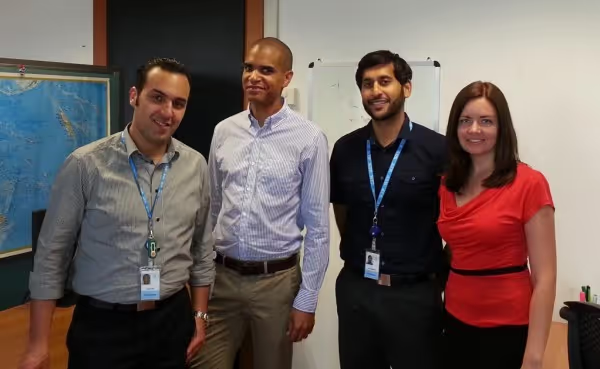Press 1 if you have not eaten today’ – WFP’s mVAM project

Allow us to introduce ourselves – from left to right, Wael, Jean-Martin, Amit and Marie –the WFP mVAM team in Rome, Italy. Two of the others, Inci and Filippo, were out of town when we took the photo. We are part of WFP’s Vulnerability Analysis and Mapping (VAM) service – we’re excited to start working on the mVAM project! The communication people at the HIF and WFP have ensured that we’ve gotten some good coverage on the launch of the pilot, including a story on the WFP website and a feature on the DevEx #innov8aid blog. The headline ‘Press 1 if you have not eaten today’ captures what we are trying to do.
How did we get started? When Jean-Martin went home to the US last summer, he remembers that his mom was so irritated by incessant automatic calls that she had begun screening all of her incoming phone calls. He came back to Rome thinking that (although annoying), ‘robocalls’ could possibly make primary data collection more efficient for WFP. In the technical jargon, these automatic calls are called interactive voice response (IVR). Amit had a prior interest in IVR, Marie and Wael were curious, after having both worked on SMS-based data transmission themselves. After a literature review, an expression of interest was sent to the HIF. In January 2013, we ran a test in Democratic Republic of Congo involving SMS questionnaires through GeoPoll, a polling company. Results showed that we can generate coherent data by contacting respondents through their cell phones. The funding from the HIF was confirmed a few months later.
We’re now working on implementation. On the technical side, we’ve been busy ‘translating’ our standard food security questionnaires into a series of short voice questions. The trick is to define a short questionnaire module – voice questionnaires must be short - without losing too much information. The mVAM project will force us to understand the trade-offs and tensions between the capabilities of voice technologies on the one hand, and WFP’s core information needs on the other. We plan on testing these questions later this year.
We’re also in touch with the team at Listening to Dar, to help us learn more from their experience, as they’ve done 19 rounds of mobile surveys since 2011. Best practices from Listening to Dar have been instrumental in planning for the mVAM pilot in DRC and Somalia.
The next step for us are the scoping missions which are scheduled to take place in Nairobi (for Somalia) and in Kinshasa over the coming weeks. These missions will facilitate discussions with partners, outline workplans for mVAM implementation and help us make informed decisions on methodology and technical matters. Stay tuned for more information on these missions in our next update.
Stay updated
Sign up for our newsletter to receive regular updates on resources, news, and insights like this. Don’t miss out on important information that can help you stay informed and engaged.
Explore Elrha
Learn more about our mission, the organisations we support, and the resources we provide to drive research and innovation in humanitarian response.


.png)